With the collapse of traditional parties around the world and with many pundits predicting a "crisis of democracy", the value of elections as a method for selecting by whom and how we are governed is being questioned. What are the virtues and weaknesses of elections? Are there limitations to what they can realistically achieve? In this deeply informed book world-renowned democratic theorist Adam Przeworski offers a warts-and-all analysis of elections and the ways in which they affect our lives. Elections, he argues, are inherently imperfect but they remain the least bad way of choosing our rulers. According to Przeworski, the greatest value of elections, by itself sufficient to cherish them, is that they process whatever conflicts may arise in society in a way that maintains relative liberty and peace. Whether they succeed in doing so in today's turbulent political climate remains to be seen.
Jose Antonio Cheibub Libri




Democracy and Development
- 336pagine
- 12 ore di lettura
Examines impact of political regimes on economic development between 1950 and 1990.
Presidentialism, Parliamentarism, and Democracy
- 224pagine
- 8 ore di lettura
Exploring the stability of political systems, this book delves into the factors contributing to the fragility of presidential democracies compared to their parliamentary counterparts. It analyzes the structural and institutional differences that may lead to higher rates of breakdown in presidential systems, offering insights into governance, accountability, and the implications for democratic resilience. Through a critical examination of various case studies, it aims to enhance understanding of political stability and the challenges faced by different democratic frameworks.
»Wenn die Vergangenheit die Zukunft erhellen soll, müssen wir prüfen, ob die Bedingungen in der Gegenwart denen in der Vergangenheit entsprechen.« Steckt die Demokratie in der Krise? Befinden wir uns in einer ähnlichen Lage wie zur Zeit der Weimarer Republik? Adam Przeworski sucht nach Antworten, indem er Staaten unter die Lupe nimmt, die ein Abgleiten in autoritäre Verhältnisse erlebten. Er identifiziert drei Bündel von Ursachen: ökonomische wie Wohlstand und Ungleichheit, soziale, aber auch im engeren Sinn politische. Heute sei die Situation in vielen Staaten dadurch gekennzeichnet, dass Teile der Bevölkerung nicht länger am wachsenden Wohlstand partizipieren und den Glauben an eine bessere Zukunft verloren haben. Doch wenn Menschen den Eindruck bekommen, sie könnten ihr Leben durch Wahlen nicht länger positiv beeinflussen, steige die Wahrscheinlichkeit, dass sie sich gegen das System wenden.